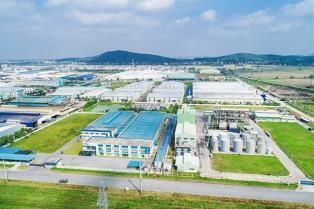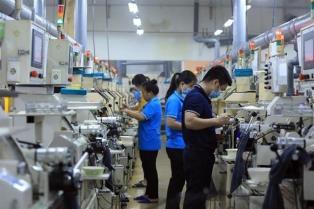Along with science, technology, innovation and digital transformation, the capital city has identified the private sector as a key pillar of its economy, aiming to develop the sector into one of its most important growth engines.

Hà Nội is stepping up efforts to unlock the potential of the private sector and turn the sector into a key driver of socio-economic development, with strong actions already in place.
Along with science, technology, innovation, and digital transformation, the capital city has identified the private sector as a key pillar of its economy, aiming to develop the sector into one of its most important growth engines, according to Trương Việt Dũng, deputy chairman of the municipal People’s Committee (the city's administration).
The city aims to see 300,000–350,000 enterprises operating efficiently by 2030, or about 35 businesses per 1,000 residents, equivalent to levels in Malaysia.
Private companies are expected to contribute to enhancing competitiveness and expand business and production in the region.
Hà Nội has set a goal for the private sector to contribute 55-60 per cent of its gross regional domestic product (GRDP) by 2030, with at least three enterprises capable of joining global value chains.
Under the city’s plan, by the end of 2030, the private sector will play a pioneering role in science and technology development as well as innovation and digital transformation, with at least 50 per cent of firms engaging in innovation, over 70 per cent of small and medium-sized enterprises (SMEs) using digital platforms and 70 per cent of SMEs achieving a full digital transformation.
By the end of 2025, the number of active firms is expected to increase to 230,000 from the current 155,000 in Hà Nội, 97.2 per cent of which are private companies. The private sector is projected to contribute about 48 per cent of the capital city’s GRDP and create nearly 80 per cent of new jobs, or 200,000 positions per year.

Growing contributions
Official data also show that private investment is expanding at an average of 7 per cent per year, accounting for 57.8 per cent of the city's total investment.
There are also more than 350,000 business households in the city, of which over 10,000 have annual revenue exceeding VNĐ1 billion, contributing significantly to trade and services.
With a goal of GRDP growing by at least 8 per cent in 2025 to reach US$63.5 billion, Hà Nội hopes to promote the development of the private sector, digital transformation and innovation to improve productivity as well as encourage private enterprises to participate in global value chains.
According to Dũng, Hà Nội’s private businesses have many strengths. They are dynamic, responsive and adaptable, with a strong spirit of entrepreneurship. Numerous enterprises have achieved international standards, helping to uphold Hà Nội as a creative, energetic and globally integrated city.
However, most enterprises remain SMEs with limited capital, uneven management capacity, and weak links to value chains.
More than 80 per cent of firms have less than VNĐ10 billion in capital and face difficulties in technology and participation in global supply chains.
To address these challenges, the city is focusing on supporting innovation and digital transformation, developing a high-quality workforce, promoting supply chain links and improving mechanisms for green investment and international-standard governance.
Following the issuance of Resolution 68 by the ruling Communist Party of Việt Nam on developing the private economy, Hà Nội has rolled out a series of policies and initiatives to streamline administrative procedures and improve planning transparency to attract investment.
The city is also focusing on removing legal bottlenecks and improving access to land, credit and technology while promoting links between private firms and other economic sectors to establish supply chains.
The municipal People’s Council (the city's assembly) in July issued Resolution 16 on support for SMEs from 2026 to 2030, a bold policy lever aimed at concretising the Party's goal of developing the private economy.

Digital momentum
Hà Nội has also approved a comprehensive project to support the development of SMEs for the 2026–2030 period, aiming to foster innovation, strengthen competitiveness and promote private sector growth for a more sustainable economy.
Under the city’s resolution on innovation and start-up ecosystems, Hà Nội will provide support of up to 70 per cent of costs for capacity-building, and will also offer access to infrastructure, including high-tech parks, innovation hubs, incubators, and technology exchanges.
“Hà Nội has launched many policies supporting science and technology innovation. Establishing a technology exchange and innovation centre will benefit businesses and SMEs,” said Trịnh Thị Ngân from the Hà Nội Association of SMEs.
In an effort to facilitate production and business, the city is focusing on digital transformation to enhance e-governance and service delivery through platforms like iHanoi and E-Cabinet. Municipal authorities plan to allocate VNĐ50 billion to help SMEs go digital this year.
The Hà Nội Support Centre for Enterprise and Investment Promotion is also implementing programmes to support SMEs and promote the development of the private sector in the city such as business incubation, start-up, digital transformation, human resource development, and business consultancy.
“The capital city should focus on promoting the development of innovative intellectual enterprises and become the country’s leading hub for innovation, finance and technology,” former director of the Việt Nam Institute of Economics Trần Đình Thiên said.
Mạc Quốc Anh, vice president of the Hà Nội Association of SMEs, said that Hà Nội had consistently emphasised the importance of the private sector for the development of a modern and civilised capital city.
The city had introduced a number of dedicated policies to support enterprises, such as funding for start-ups, the digital and green transformation, access to land and workforce training.
Sectors with the most potential in the regional economy included supporting industries, green technology, high-quality healthcare and education, logistics, and creative services, he said. VNS




